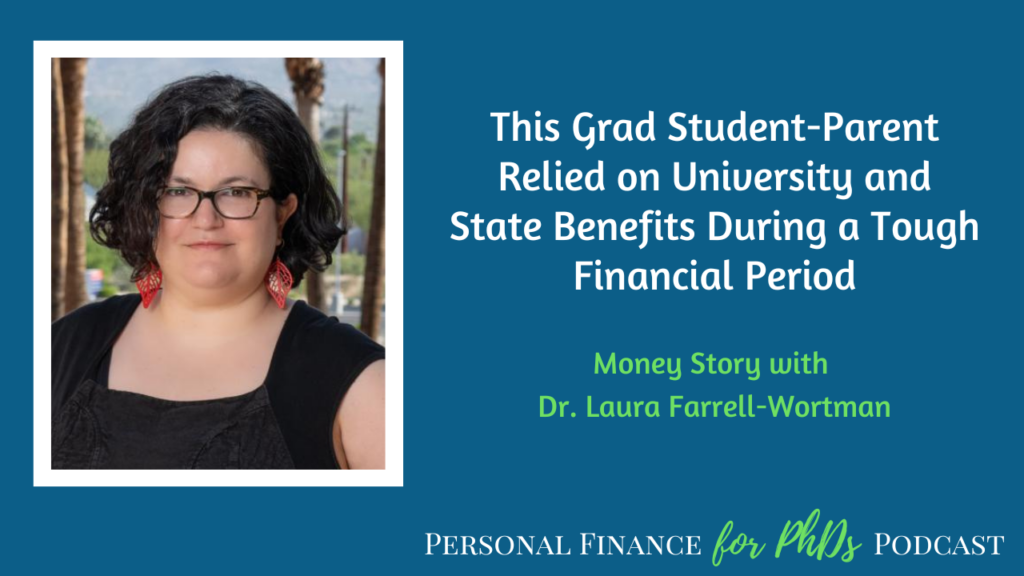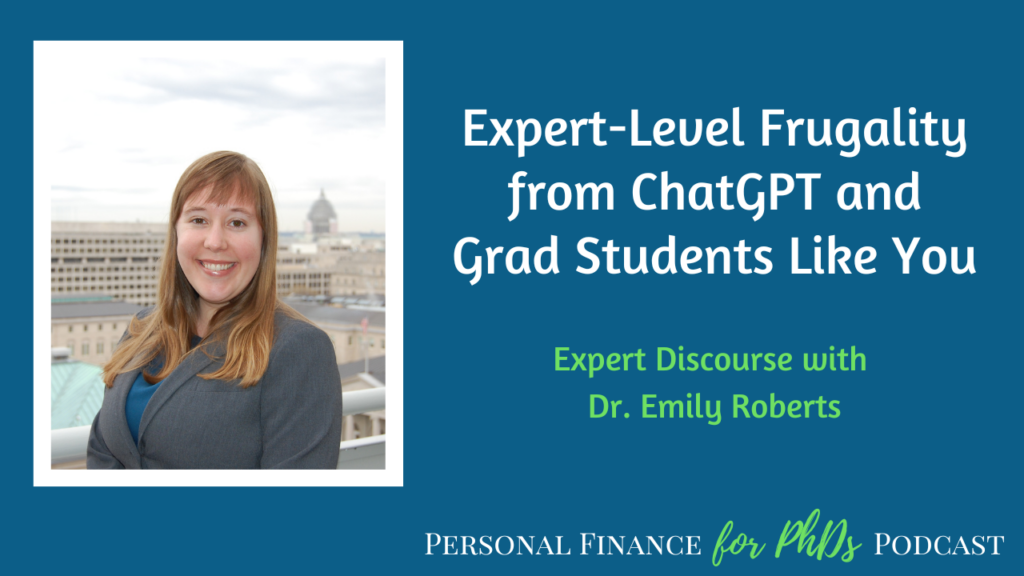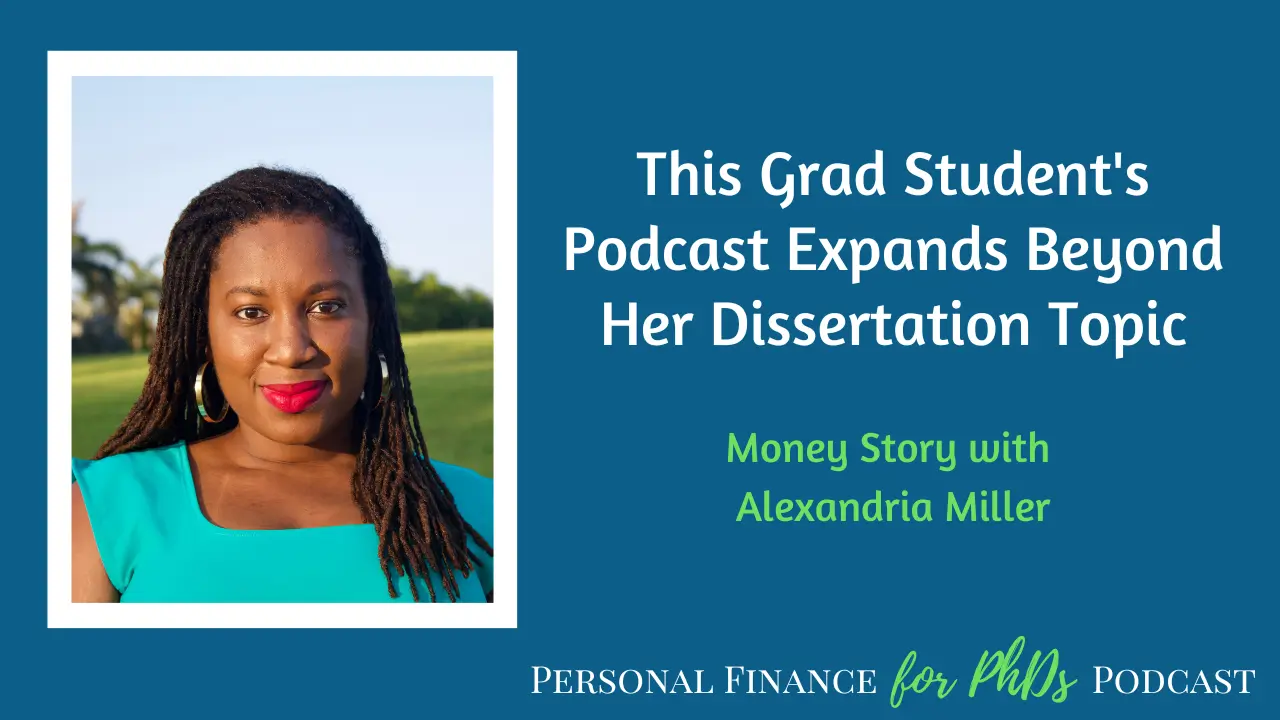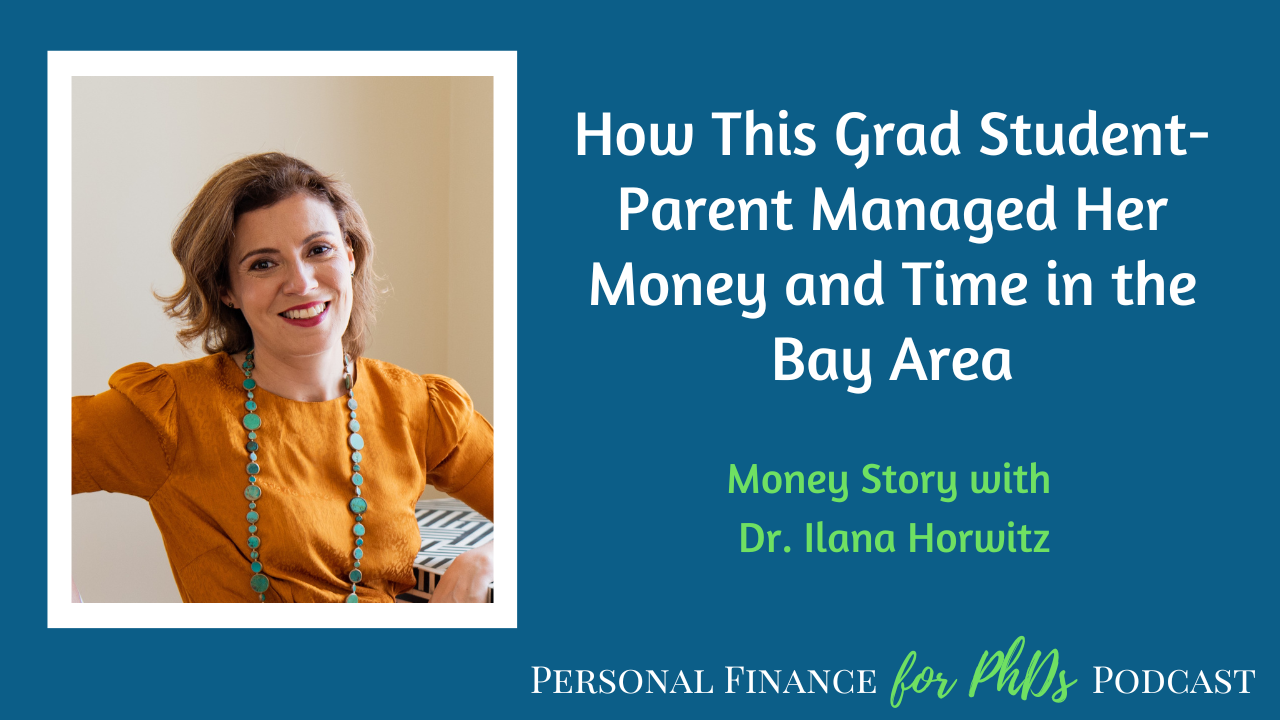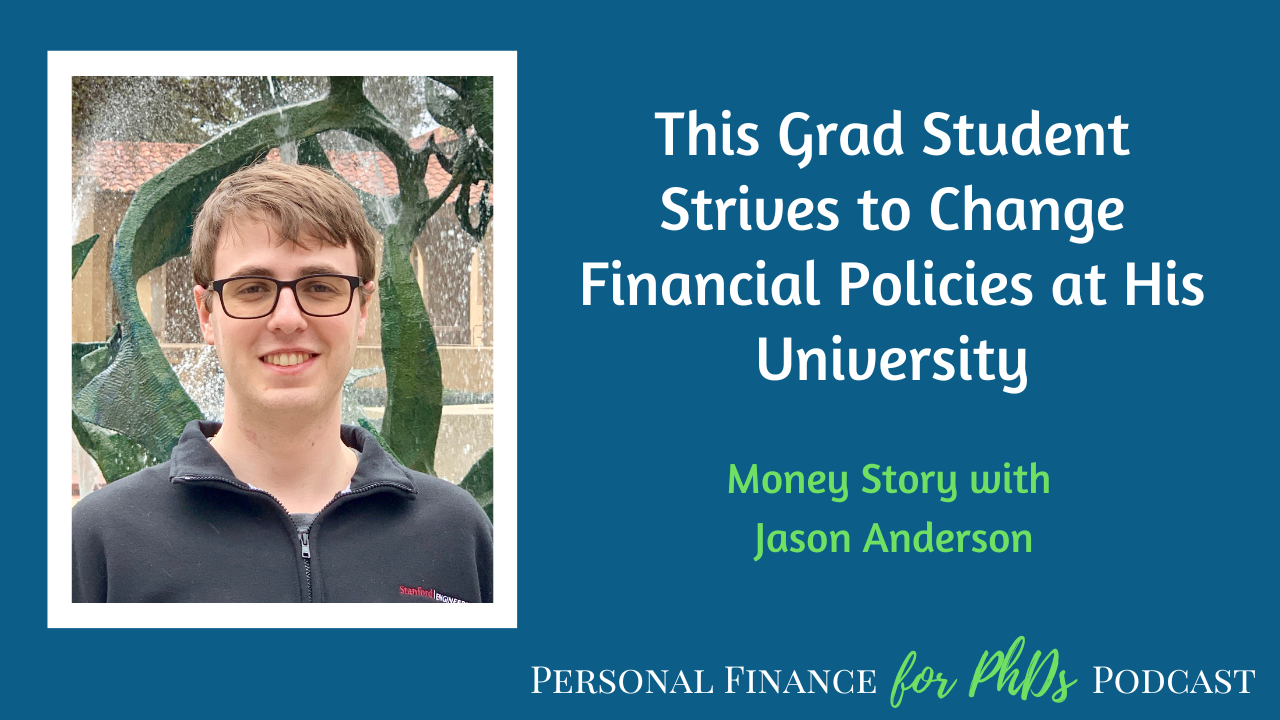Emily published the first episode of this podcast in July 2018. This is the 200th episode, and over the last five and a half years, the podcast has featured 252 unique voices in addition to Emily’s. This last episode of 2023 catches up with the guests from Seasons 1 through 11. The guests were invited to submit short audio updates on how their lives and careers have evolved since the time of their interview. They also included their best financial advice for an early-career PhD if their answer has changed since the initial interview.
Links mentioned in the Episode
- PF for PhDs Podcast Hub
- PF for PhDs Subscribe to Mailing List
- The Personal Finance for PhDs Website
- Emily’s E-mail Address
- Dr. Jill Hoffman (from Toddler on the Tenure Track): Season 3, Episode 4
- Dr. Samantha McDonald: Season 8, Episode 3
- Lucy Bryan (from Polygence): Season 10, Episode 3
- Dr. Sean Bittner (from The Life Science Coach): Season 6, Episode 12; Season 10, Episode 14
- Dr. Nelson Zounlome (from Liberate the Block): Season 10, Episode 16
- Maya Gosztyla: Season 2, Episode 4; Season; Season 11, Episode 1
- Dr. Jeanelle Horcasitas: Season 11, Episode 3
- Dr. Leslie Wang (from Your Words Unleashed): Season 11, Episode 10
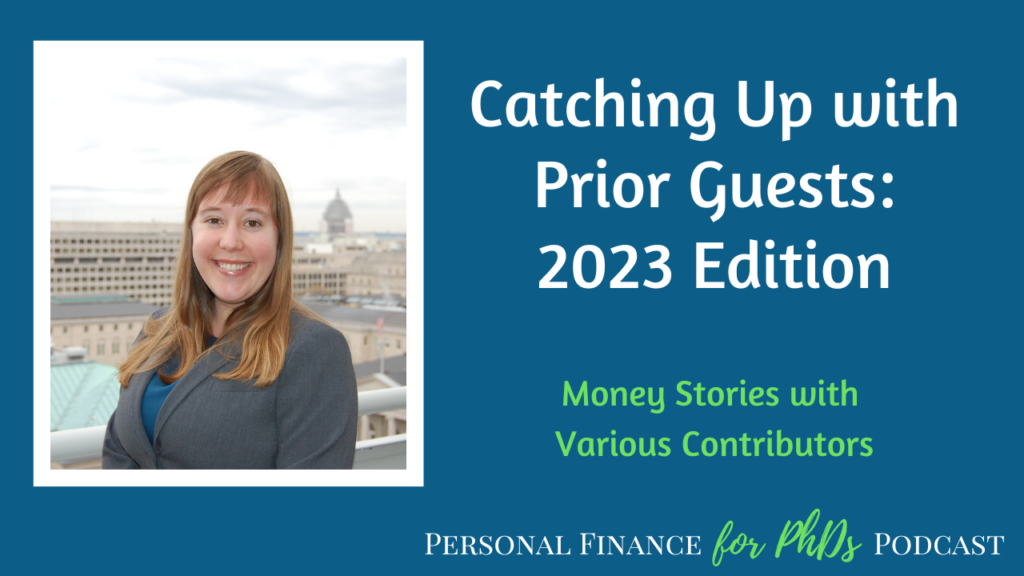
Teaser
00:00 Samantha: And I talked a lot about saving and budgeting the last time I was on the show, and I still think that’s a really important skill for everyone to have, but I’ve also learned since then that it’s equally important, if not more so, to advocate for yourself and make sure you’re actually getting the pay that you deserve and that you need to live in the city where you’re going to grad school.
Introduction
00:17 Emily: Welcome to the Personal Finance for PhDs Podcast: A Higher Education in Personal Finance. This podcast is for PhDs and PhDs-to-be who want to explore the hidden curriculum of finances to learn the best practices for money management, career advancement, and advocacy for yourself and others. I’m your host, Dr. Emily Roberts, a financial educator specializing in early-career PhDs and founder of Personal Finance for PhDs.
00:52 Emily: This is Season 16, Episode 8, and today I am featuring many guest voices! I published the first episode of this podcast in July 2018. This is the 200th episode, and over the last five and a half years, the podcast has featured 252 unique voices in addition to my own. For our last episode in 2023, I thought it would be fun to catch up with the guests from Seasons 9 through 11, and a few from earlier seasons as well. I invited them to submit short audio clips to update us on how their lives and careers have evolved since the time of our interview, as well as to provide their best financial advice if that has changed since our initial interview. We have some very big and very exciting updates this year, and I’m confident you are going to appreciate the perspectives that these guests bring. The audio clips in this episode are ordered by when the original episode was published. If you’d like to circle back and listen to any of the previous interviews, you can do so in your podcatcher app or at my website, PFforPhDs.com/podcast. To keep up with future episodes, please hit subscribe on that podcatcher and/or join my mailing list at PFforPhDs.com/advice. You’ll hear an update from me first, followed by the rest of the guests. You can find the show notes for this episode at PFforPhDs.com/s16e8/. Happy listening, happy holidays, and happy new year! See you in 2024!
Dr. Emily Roberts
02:31 Emily: Hi! This is Emily Roberts from Personal Finance for PhDs. I am of course the host of this podcast and you hear from me in every episode! 2023 started off really rough with the hospitalization of both of my husband’s parents and ultimately the death of his father. For months we were barely holding things together logistically with our household and their household and really leaned on our extended family and local friends. Honestly, I couldn’t get everything done in a timely manner with Personal Finance for PhDs during that tax season, which is my busiest time of year. Thank goodness I had three wonderful people working with me who stepped forward to keep the lights on while I took time away to be with my loved ones.
03:18 Emily: It was a slow climb out of that period but this past summer and fall were really wonderful for me and my family. Now that my younger child is in kindergarten and more independent, we have a really good household rhythm. I read every day, and my family often plays games together. I’m leading two Girl Scouts troops, one for each daughter, which is kind of crazy but enjoyable. We have a wonderful local community. Life is very sweet. Oh, and I started using Asana for my household and personal life, like I do for my business, and it’s been amazing for staying on top of everything without feeling overwhelmed.
03:55 Emily: On the financial side, I stopped making any efforts to budget or actively track our expenses at the start of the year. Our savings rate took a big hit, partially because of inattention, partially because Personal Finance for PhDs made less money in 2023 than 2022, and partially because we paid for a roof replacement and solar panels installation. I finally got back to active expense tracking and planning with our finances a couple of months ago. It feels great to get back to our positive habits now that we have the capacity, and thankfully the wheels didn’t completely fall off because we had pretty good systems in place. If you want to download the manual expense tracker I created for my and your use, go to PFforPhDs.com/tracker/.
04:44 Emily: I am hoping for a better year for Personal Finance for PhDs in 2024 than I had in 2023. If you’re a fan of this podcast and the financial education I provide, I would very very much appreciate you recommending me to a professional development-type person at your university or alma mater. Thanks for listening to my update! If you want to get in touch, you can visit my website at PFforPhDs.com or email me at [email protected].
Dr. Jill Hoffman
05:13 Jill: Hi, I’m Jill Hoffman from Toddler on the Tenure Track. I was on Season 3, Episode 4 in 2019, and then I was also on a Catching Up with Prior Guests episode at the end of 2020, which was Season 7, Episode 16. In the last update, I shared that my family and I were contemplating a move back to the East Coast from Oregon. We were expecting a baby and I was an assistant professor. Since that time, we have moved back to the East Coast, back to my home state of Virginia. The baby we were expecting is now two and a half years old, and I quit my job as an assistant professor right before I was supposed to go up for tenure. So lots of big changes.
05:56 Jill: In my original episode, I talked about the Public Service Loan Forgiveness Program and student loan debt, as well as me working while my husband was a stay at home parent. And now my husband and I have switched. I’m staying at home and he’s working full time. And because I’m no longer working, I’m not actively working towards loan forgiveness. I actually have, I think about 13 months left, so not that much time at all in the grand scheme of things, but we chose to push pause on that path for now. In total, we have about 73, 000 in student loans left, which is about 10,000 less than where we were at at the time of my original podcast episode. We’re just paying the minimum right now, and that’s our plan with the new save plan. Financially, it doesn’t make sense to try and aggressively pay them down at this point. While being a stay at home parent is my main focus, I’ve also sought out some additional professional opportunities just to use my brain in a different way during the week.
06:54 Jill: I’m actually working in a virtual assistant role with Emily, supporting both her financial education workshops, as well as the podcast. And then I’ve been doing a little bit of coaching for early career academics. And I have a small Etsy shop with some digital products. So I’m dipping my toes in a number of different things and I’m really loving all of it. My plan is to slowly expand the virtual assistant and coaching work, especially once my youngest gets to kindergarten in a few years. As far as best financial advice for early career PhDs, what was helpful for me, and it is still really helpful for me, is knowing exactly what money is coming in and what money is going out. So tracking on a regular basis in a spreadsheet or with an app, I just use a spreadsheet. Just some way to show you where your money, money is going is so helpful. You can find me online at my website, ToddlerOnTheTenureTrack.com.
Dr. Samantha McDonald
07:47 Samantha: Hi, my name is Samantha McDonald. I have a PhD in informatics from the University of California, Irvine, and I joined Emily on the podcast in season eight, episode three, back in 2021. My episode was about knowing your worth and discussing what it was like to make the most money as a graduate student in my department when so many of my peers were struggling with less. I think my trajectory after grad school has been quite different than most. Immediately after graduating, I took a few months off to go backpacking, work on a farm in New Mexico, and travel with my family, just to do things that I just really wanted to do on my bucket list. Then I started my first real job in industry, working as a user experience researcher at Meta, formerly known as Facebook, and I worked there for almost two years aggressively saving, in a similar way to FIRE. The reason why I was aggressively saving during my first real job is really twofold. One, I wanted to keep my standard of living low to not become trapped having to work. I saw quite a few friends and colleagues start doing that right out of their PhDs. And second, my partner Michael and I were preparing ourselves for a multi year seabattical on our sailboat. Michael actually has his own episode that is in season 14, episode nine. Both of us were in graduate school almost until our thirties. As much as it sounded nice to go straight into a full job after school, we, we really wanted to use this time in our lives to take risks and do things we probably couldn’t do once we settled down, you know, like buy a house, have kids and, you know, you need to have full time jobs often to support those higher expenses.
09:23 Samantha: So now here we are eight months later. We’re still enjoying our time off. We sailed from California to Mexico and back, and now we’re gearing up to sail back to Mexico post hurricane season and potentially cross to spend some time sailing in French Polynesia. Um, based on my experience my best advice for early career PhDs is really to live below your means and don’t accumulate debt or high expenses too early. I know it can be easy to feel like you should treat yourself after so much time with low income, but I saw a lot of my friends now feel lost at a job they don’t want, but they can’t leave because they’ve already increased their expenses with cars and house and activities and hobbies and things that, that don’t necessarily make them happy and fulfilled in that same way. My partner and I have a little bit more extreme case of saving up and living way below our means on a little sailboat. Um, but I think everyone has their own passions and, you know, life is short and you need to explore those things. And luckily people with PhDs, uh, will, you’ll never have a hard time finding a job. So as scary as it is to sort of take time off, for me and Michael, it was the way that we wanted to go. And we’re definitely not regretting it. Eventually we’ll have to go back and get jobs, but we are treating money at this point like a commodity for happiness. And right now this is what makes us happy. Thank you so much for having me again. And, uh, if anyone has any questions or wants to contact me, they’re more than welcome to my email is [email protected]. It’s spelled like Sam, Mick five, seven, seven, three. Thanks.
Lucy Bryan from Polygence
10:58 Lucy: Hi, this is Lucy from Polygence. I’m Polygence’s mentor success manager, and I’m so excited to update you all on both Polygence and our mentoring model after my colleagues Jen and Steven spoke on these topics with you all in season 10 on episode 3. One update from us is that we’ve standardized mentor rates to be based on degree level rather than field as an effort to be really transparent with mentors about their pay rate and what they can expect upon degree completion. For instance, if they’re receiving their M. A. or PhD. We now have over 3, 000 mentors in our mentor pool, both graduate students and industry experts. Another exciting update is that we’ve already grown so much from that Season 10 episode, as we now have over 3, 000 mentors in our mentor pool, both graduate students and industry experts. We just looked at a breakdown of how many projects our mentors worked on in 2023 and it ranges from 1 to 15 per mentor. So it’s great to see the flexibility of this role, as each mentor can select projects and the number of concurrent students that work best for their workload. It’s also exciting for us to keep growing and to know that over 3,600 Polygence projects have been completed, which is really a testament to the work of the mentors and also speaks to how excited many high school students are about research and getting to decide what they learn and spend their time exploring.
12:21 Lucy: If you’d like to learn more about Polygence or the mentor role, you can contact me, Lucy, at [email protected], spelled P O L Y G E N C E. org. Definitely check out our website, polygence.org, where you can see many of our amazing current mentors too.
Commercial
12:44 Emily: Emily here for a brief interlude! I’m hard at work behind the scenes updating my suite of tax return preparation workshops for tax year 2023. These pre-recorded educational workshops explain how to identify, calculate, and report your higher education-related income and expenses on your federal tax return. For the 2023 tax season starting in January 2024, I’m offering four versions of this workshop, one each for US citizen/resident graduate students, postdocs, and postbacs and non-resident graduate students and postdocs. While I do sell these workshops to individuals, I prefer to license them to universities so that the end users, graduate students, postdocs, and postbacs, can access them for free. Would you please reach out to your graduate school, graduate student government, postdoc office, international house, fellowship coordinator, etc. to request that they sponsor one of my tax preparation workshops for you and your peers? I’d love to receive a warm introduction to a potential sponsor this fall so we can hit the ground running in January serving those early bird filers. You can find more information about licensing these workshops at P F f o r P h D s dot com slash tax dash workshops. Please pass that page on to the potential sponsor. Now back to our interview.
Dr. Sean Bittner
14:29 Sean: Hello, this is Sean Bittner. And I was a guest on personal finance for PhDs for season six, episode 12 in 2020 and season 10, episode 14 in 2021, as well as the 2022 catch up episode. Apologies for the audio. I am taking full advantage of health insurance before the end of the year and had a much needed nasal surgery done recently. Since my last job update, quite a lot has happened personally and professionally, my wife and I both took new jobs. She’s now in consulting and accepted a board seat for the local nonprofit and I now work in technology transfer, joined a new coaching company and just completed my 5th semester as a leadership educator. This year, we traveled to Japan, Italy, and 3 national parks. And as I record this, we’re currently on baby watch as our daughter is expected early in the new year and could arrive any day. For an update on my advice, my only update this time around is there’s truly never a good time for making big life decisions.
15:30 Sean: Everyone that listens to this podcast is smart and intelligent and a planner in one way or the other, but the last few years have really shown me that there’s always risks and rewards and never a perfect way to time something, especially something big. Uh, so I want to just encourage people, uh, fear of the unknown is certainly natural, uh, but, but there will always be reasons to not do something. If you want to keep in touch with me, you can find me on the site formerly known as Twitter for as long as it exists @lifescicoach or on Instagram at Sean without an H. As well as on LinkedIn, I’m again, taking new coaching clients this year, which I’m really excited about as well. So if you’re interested in exploring leadership and career potential, please send me a note. I’d be happy to meet with you. Thanks for listening.
Dr. Nelson Zounlome
16:20 Nelson: This is Dr. Nelson Zounlome, founder and CEO of Liberate the Block. I appeared in season 10, episode 16, um, and since then I’ve had a few changes and updates. So, um, after, uh, that year I left my tenure track faculty position and started working on LTB full time. Um, we’ve been able to expand a little bit. So, um, just recently we actually, uh, published our second book I Thrive: An International Students Guide to Thriving in the US and then we have an upcoming book Lift As You Climb: The Black Book of Academic Encouragement. And then lastly, have been able to publish our asynchronous course, developing a graduate school thrive mindset. So since leaving academia, I’ve been able to, again, focus more on the business, completed some business accelerators to better, you know, just learn business skills, networking, different things like that. I’ve also been able to continue to do some research, particularly just among BIPOC students and other folks in, in higher ed. Also, as a psychologist, I’ve been able to do a little, uh, therapy as well, and so that’s been really cool to have kind of a balance of all my skill sets in my, uh, in my time after academia.
17:46 Nelson: My best advice for folks, again, is really just to start early, not waiting until after your PhD to think about finances, to think about your, um, the life that you want to live, you know, and so the best advice I really have is to take the time to think about your values, who you want to be, um, think about the type of life you want to live, right? The type of work life synergy you want to have, um, being able to cultivate that now. And so I referenced, um, different resources in my life. Episode such as the millionaire next door the automatic millionaire two additional resources that I wanted to highlight were Um, we should all be millionaires by Rachel Rogers a really good book on Just mindset, but also practical ways in which you can start to really Um excel right in in your life. Um, and then the other one is get good with money, uh, 10 simple steps to becoming financially whole by Tiffany Aliche. And so this is a really great, easy guide to just figuring out how to, again, start investing, um, talks about insurance and, and, and different things like that. Um, and so feel free to, to check out my episode, season 10, episode 16, for a bit more information, and I wish you all well on your PhD journey and, uh, getting financially whole.
Maya Gosztyla
19:10 Maya: My name is Maya Gosztyla, and I’m a fifth year PhD candidate in biomedical sciences at the University of California, San Diego. I previously appeared in Season 2, Episode 4 of the show, back when I was a post bacc fellow at the NIH, and I appeared again in Season 11, Episode 1, when I was in my third year of grad school. The biggest thing that’s changed since I last appeared on the show was that student researchers at my university formed a union, and we organized the largest labor strike in the history of U. S. higher education, with 48, 000 of us walking off the job for a total of six weeks. And as a result, we were able to negotiate our very first contract, which included By far the largest pay raises in the history of my program, in addition to other benefits like paid time off, protections from workplace abuse, appointment security guarantees, and a whole bunch more.
20:07 Maya: And so now I have a lot more financial security thanks to our increased pay, and it’s just been a major improvement for my quality of life overall. And I talked a lot about saving and budgeting the last time I was on the show, and I still think that’s a really important skill for everyone to have, but I’ve also learned since then that it’s equally important, if not more so, to advocate for yourself and make sure you’re actually getting the pay that you deserve and that you need to live in the city where you’re going to grad school. And I’ve noticed that grad students at a lot of other universities have been recently unionizing as well, so I’m really excited to see how this changes the financial landscape of graduate school across the country moving forward.
Dr. Jeanelle Horcasitas
20:43 Jeanelle: Hi everyone, this is Jeanelle Orcasitas. I had the pleasure of speaking with Emily in Season 11, Episode 3. where I talked about the multiple jobs I worked during graduate school to pay off debt. Since then, I’ve had a couple of life updates that I’d like to share with you all. The first update is that I sold and bought a new home with my husband, which was really great because we had built up a lot of equity at the time. However, we had to take on a higher interest rate because they had just increased it. We also learned there’s a lot of extra costs that are involved when you’re both Selling and buying a new home and always read the fine print, especially when it comes to liens. We actually had to pay several thousand dollars on a lien we weren’t aware of in order to sell our home. So there was a lot of lessons learned we, we gained in our second round of home buying. The second update I wanted to share is that earlier this year, I experienced a layoff. And at the time it was very shocking and it felt like the rug was pulled from underneath me. But I was really thankful that my husband and I had prepared and we had a six month emergency fund built up. And I was fortunate enough to receive a severance package. And so even though this was an extremely stressful and uncertain time for me, I was really grateful that we could stick to a budget, adjust it as needed for costs that we had a savings in place that could really extend me for a long time as I embarked on the job search.
22:31 Jeanelle: But connecting back to all of the multiple jobs in graduate schools that I had, I wanted to give a key piece of advice, which is always stay connected with folks in your network. You never know when you’re going to need to ask for help. And during this time, I reached out to many of those people I had worked with, and this really helped me land interviews and eventually jobs. This was also a time that made me think deeply about what I wanted from a career. And so I actually transitioned out of tech and went into the dental insurance industry. So I would say after a really odd year of some ups and downs with buying and selling a home and losing a job and then getting a job again. Um, ultimately I’ve learned that the power of saving and just having that emergency fund because you never know when you’re going to need it and when it’s going to come and it will just make you feel significantly lighter and taking on the stress of whatever you’re going through. Thank you.
Dr. Leslie Wang
23:40 Leslie: This is Leslie Wang, writing coach and the founder of my company, Your Words Unleashed, where I help scholars write and publish books that matter. I was featured on season 11, episode 10 of this podcast called This Prof is Taking Deliberate Steps Towards Self Employment. The episode dropped in May, 2022, and I’ve had a lot of exciting changes in my life and career since then. In our episode, Emily and I talked about how I was planning to leave the Academy in a couple of years, once the business became sustainable. But by the time the episode was published, I had actually already turned in my resignation. I had reached a point where I no longer wanted to pretend that I was still committed to academia. And I had also experienced a lot of success in my business, and I wanted to see what I could do with it full time. And I also realized that I was never going to feel 100 percent ready to give up a totally secure position. So I turned in my resignation in April of 2022. And if this gives you any indication of the kind of institution I was at, the Dean’s office never even responded to my resignation email, except to ask my department chair to ask me to return all of my electronics.
24:58 Leslie: I spent the summer of 2022 mentally adjusting to leaving academia, which was very sad for me, even though I had been planning for it for four years. But ultimately it was the best thing I could have done. I’ve been full time in my business since August, 2022, and my business has grown a lot. I started my own podcast called Your Words Unleashed, where I give writing tips and publishing advice, and I’ve done more than 40 episodes and gained a loyal listenership. But for more than the first year, I was really overworking. I was burning out and realized I had taken some bad habits from academia into my non academic work life. So this fall, I got really serious about limiting the number of clients I take on. And I also raised my rates so that I can actually live the kind of life that I want. And because I know people are always interested in the financials, I will share that in each of the first two years of my business, I have surpassed six figures. Which is much more than I made as a professor. At the same time, this does not come with any health or retirement benefits. I would not have been able to make this kind of transition without my husband, who put me and our child on his health insurance. But overall, I’m incredibly happy to be at this point in my life and career. I work only 25 to 30 hours per week and never at night or on weekends. In terms of advice that I have for early career PhDs, I know that a lot of folks are looking to leave higher ed, And you might be struggling and burnt out and you need to leave right away.
26:33 Leslie: But if you do have a steady income from a position, I would advise you to keep it while you’re looking for your next big step. The best thing I could have done was to build my business within the security of my academic job. It gave me the ability to experiment and make mistakes and take risks without risking at all. But if you’re really unhappy, like I was, make sure to set a final deadline so that security doesn’t impede you from taking a chance on yourself. So if you want to connect with me or find out more about what I do, you can find me on LinkedIn under my name, Leslie Wang, or go to my website at www.yourwordsunleashed.com. You can listen to my podcast from there or join my list serve. I send out weekly writing tips and strategies for living a more satisfying life. So thanks again, Emily, for having me on and happy holidays to you all.
Outtro
27:29 Emily: Listeners, thank you for joining me for this episode! I have a gift for you! You know that final question I ask of all my guests regarding their best financial advice? My team has collected short summaries of all the answers ever given on the podcast into a document that is updated with each new episode release. You can gain access to it by registering for my mailing list at PFforPhDs.com/advice/. Would you like to access transcripts or videos of each episode? I link the show notes for each episode from PFforPhDs.com/podcast/. See you in the next episode, and remember: You don’t have to have a PhD to succeed with personal finance… but it helps! Nothing you hear on this podcast should be taken as financial, tax, or legal advice for any individual. The music is “Stages of Awakening” by Podington Bear from the Free Music Archive and is shared under CC by NC. Podcast editing by Dr. Lourdes Bobbio and show notes creation by Dr. Jill Hoffman.
